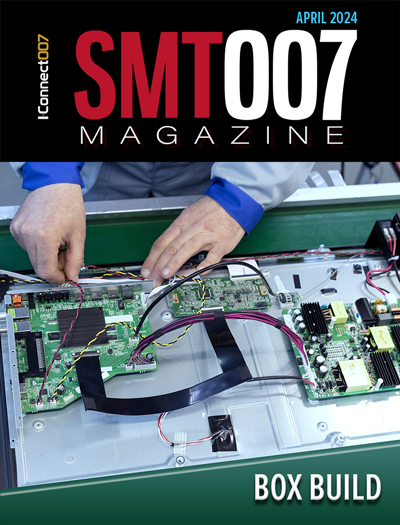-

- News
- Books
Featured Books
- smt007 Magazine
Latest Issues
Current Issue
Box Build
One trend is to add box build and final assembly to your product offering. In this issue, we explore the opportunities and risks of adding system assembly to your service portfolio.

IPC APEX EXPO 2024 Pre-show
This month’s issue devotes its pages to a comprehensive preview of the IPC APEX EXPO 2024 event. Whether your role is technical or business, if you're new-to-the-industry or seasoned veteran, you'll find value throughout this program.

Boost Your Sales
Every part of your business can be evaluated as a process, including your sales funnel. Optimizing your selling process requires a coordinated effort between marketing and sales. In this issue, industry experts in marketing and sales offer their best advice on how to boost your sales efforts.
- Articles
- Columns
Search Console
- Links
- Events
||| MENU - smt007 Magazine
Show & Tell: Corporate Awards Bestowed by IPC
April 3, 2018 | Patty Goldman, I-Connect007Estimated reading time: 2 minutes
Every year IPC recognizes two companies that have made significant contributions to IPC and the electronics industry. These awards are named after industry executives who were themselves significant and outstanding contributors: one for a PCB fabricator company and one for an electronics manufacturing services (EMS) company. This year’s recipients were Northrop Grumman and Rockwell Collins, respectively. I provided a short list of questions to these companies; their responses are below.
Peter Sarmanian Corporate Recognition Award:
Northrop Grumman Mission Systems
Sarah Willoughby, VP of Western Region engineering, sciences, and technology for Northrop Grumman Mission Systems, accepted the Peter Sarmanian Corporate Recognition Award. Answers to my questions were provided by Vern Boyle, VP of advanced technologies for Northrop Grumman Mission Systems.
Patty Goldman: Congratulations on receiving this award. Please describe your company and its role in the electronics industry.
Vern Boyle: Northrop Grumman is a leader in aerospace and defense electronics. We have been designing and fabricating microelectronic devices and advanced electronic systems for years. We have our own foundry for specialized devices and manufacturing facilities for circuit boards and higher-level systems. Our products are deployed in many defense and security systems around the world.
Goldman: I’m sure there have been any number of employees involved in committee activity at IPC meetings; what do you see as the benefits of this involvement?
Boyle: Northrop Grumman has been an IPC member since 1962. IPC offers our employees a multitude of opportunities, including professional growth and development, chances to collaborate with other people across the field, and to affect standards to ensure they evolve with technology. Currently, we have 47 employees participating in over 120 technical committees at IPC, not including employees who review standards during industry review. We have employees who write papers for IPC conferences, complete IPC certification courses, and serve as mentors to new members. IPC allows them to share their knowledge and build off the knowledge of others, all while keeping industry standards as fair and up-to-date as possible.
Goldman: Our industry has changed over the years, as has IPC. Can you comment on the changes that have affected your company?
Boyle: The landscape for foundry production has changed, which presents new challenges. Maintaining access and addressing trust in the electronics supply chain are drivers. The need to cover wide bandwidths with low size, weight, and power also drives much of what we do.
To read the full version of this article which appeared in Show & Tell Magazine, click here.
Suggested Items
IDTechEx Examines the Opportunities for Wearables in Digital Health
04/19/2024 | IDTechExIDTechEx’s report, “Digital Health and Artificial Intelligence 2024-2034: Trends, Opportunities, and Outlook”, covers this ongoing trend in the consumer health wearables market and includes analysis of the opportunities and roadmap for biometric monitoring.
ZESTRON Welcomes Whitlock Associates as New Addition to their Existing Rep Team in Florida
04/19/2024 | ZESTRONZESTRON, the leading global provider of high-precision cleaning products, services, and training solutions in the electronics manufacturing and semiconductor industries, is thrilled to announce the addition of Whitlock Associates to its esteemed network of sales representatives.
IPC Bestows Posthumous Hall of Fame Award to Industry Icon Michael Ford
04/18/2024 | IPCIPC honored the late Michael Ford, Aegis Software, for his extraordinary contributions to the global electronics manufacturing industry with the IPC Raymond E. Pritchard Hall of Fame Award at IPC APEX EXPO 2024. IPC’s most prestigious honor, the Hall of Fame Award is given to individuals who have provided exceptional service and advancement to IPC and the electronics industry. Ford, an industry leader and valued IPC volunteer, died suddenly in January 2024.
SEMI Applauds U.S. Chips Act Award for Samsung Electronics Facilities to Strengthen Domestic Semiconductor Supply Chain
04/17/2024 | SEMISEMI, the industry association serving the global electronics design and manufacturing supply chain, applauded the United States Department of Commerce’s announcement of a Preliminary Memorandum of Terms for an award under the CHIPS and Science Act to support the expansion of Samsung Electronics’ presence in Texas and the company’s development and production of leading-edge chips.
Northrop Grumman honors Calumet Electronics with Supplier Excellence Award
04/17/2024 | Calumet ElectronicsNorthrop Grumman Corporation has recognized Calumet Electronics during the company’s 2024 Supplier Excellence Awards for “exceptional performance and unwavering commitment to delivering with excellence.” Calumet is one of 70 suppliers recognized from across the globe. In its award category of “Supplier Strategic Excellence,” Calumet was honored alongside global corporations such as Amazon Web Services, Dell Technologies, and Eaton Corporation.


